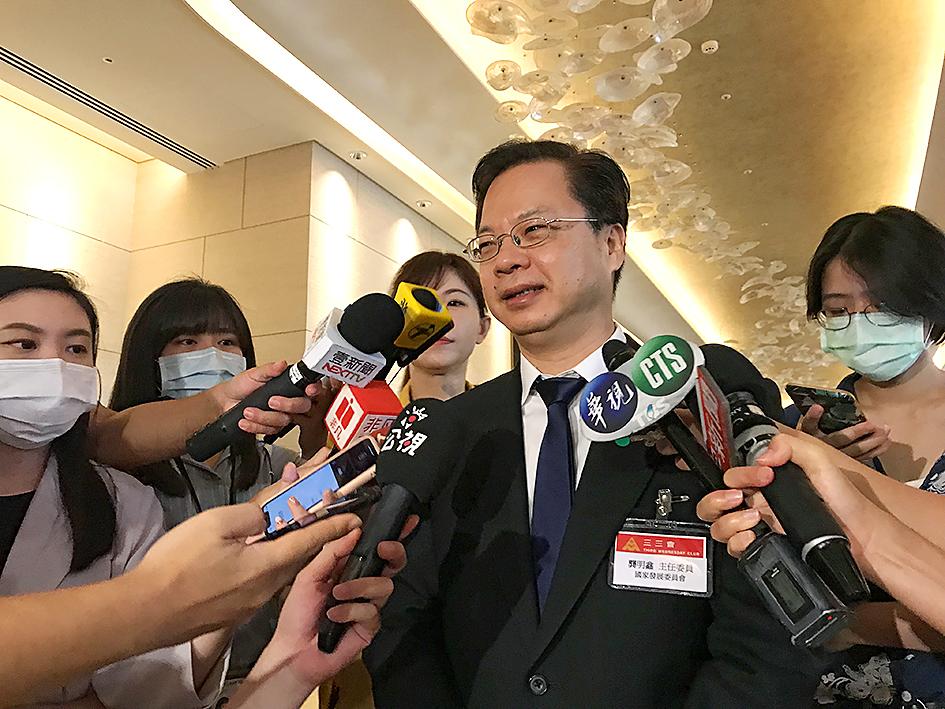The government is looking to develop a new economic model that would build Taiwan into a regional high-end manufacturing hub, while low-end manufacturing activity migrates to ASEAN, National Development Council Minister Kung Ming-hsin (龔明鑫) said yesterday at a meeting of The Third Wednesday Club, a trade group whose membership is limited to the top 100 firms in each business sector.
The government is drawing up plans to help firms cope with the COVID-19 pandemic and US-China trade tensions, which are reshaping global technology supply chains, Kung said.
The undertaking, dubbed the “economic development plan version 2.0,” calls for the deployment of a forward-looking space and microsatellite industry, the creation of a digital development department, and the nation becoming Asia’s advanced manufacturing hub, he said.

Photo: Lee Ya-wen, Taipei Times
Ministries are working to realize NT$6 trillion (US$202.14 billion) of investment projects and to increase funding for the development of renewable energy sources, Kung said.
The new economic model would seek to shore up businesses other than those in the “five-plus-two” sectors, a key policy during President Tsai Ing-wen’s (蔡英文) first term office, he said.
Electronics will no longer dominate global technology supply chains that are to undergo drastic changes due to 5G, artificial intelligence and Internet of Things technologies, he added.
International technology giants have also noted the trend and plan to increase their investments in Taiwan, which is home to the world’s leading chipmakers, chip designers, and suppliers of laptops and peripherals, Kung said.
The government is to make the development of 5G and artificial intelligence technologies its top priority, so that Taiwan could help shape and define the 5G era, he said.
However, the economic strategy does not run counter to the New Southbound Policy, as it would encourage local companies to expand in ASEAN members that would continue to attract low-end manufacturing activity from China, he added.
“Local firms would make high-end devices in Taiwan and produce low-priced products in Southeast Asian plants,” Kung said. “The division of labor is clear and makes sense.”
In the 5G era, the government would collaborate more closely with private companies, including on developments in other nations, he said.
The government has also identified an opportunity to develop Taiwan into a regional asset management center, as Hong Kong is losing its appeal due to China’s tightening control over the territory, he added.

NEW IDENTITY: Known for its software, India has expanded into hardware, with its semiconductor industry growing from US$38bn in 2023 to US$45bn to US$50bn India on Saturday inaugurated its first semiconductor assembly and test facility, a milestone in the government’s push to reduce dependence on foreign chipmakers and stake a claim in a sector dominated by China. Indian Prime Minister Narendra Modi opened US firm Micron Technology Inc’s semiconductor assembly, test and packaging unit in his home state of Gujarat, hailing the “dawn of a new era” for India’s technology ambitions. “When young Indians look back in the future, they will see this decade as the turning point in our tech future,” Modi told the event, which was broadcast on his YouTube channel. The plant would convert

‘SEISMIC SHIFT’: The researcher forecast there would be about 1.1 billion mobile shipments this year, down from 1.26 billion the prior year and erasing years of gains The global smartphone market is expected to contract 12.9 percent this year due to the unprecedented memorychip shortage, marking “a crisis like no other,” researcher International Data Corp (IDC) said. The new forecast, a dramatic revision down from earlier estimates, gives the latest accounting of the ongoing memory crunch that is affecting every corner of the electronics industry. The demand for advanced memory to power artificial intelligence (AI) tasks has drained global supply until well into next year and jeopardizes the business model of many smartphone makers. IDC forecast about 1.1 billion mobile shipments this year, down from 1.26 billion the prior

People stand in a Pokemon store in Tokyo on Thursday. One of the world highest-grossing franchises is celebrated its 30th anniversary yesterday.

Zimbabwe’s ban on raw lithium exports is forcing Chinese miners to rethink their strategy, speeding up plans to process the metal locally instead of shipping it to China’s vast rechargeable battery industry. The country is Africa’s largest lithium producer and has one of the world’s largest reserves, according to the US Geological Survey (USGS). Zimbabwe already banned the export of lithium ore in 2022 and last year announced it would halt exports of lithium concentrates from January next year. However, on Wednesday it imposed the ban with immediate effect, leaving unclear what the lithium mining sector would do in the